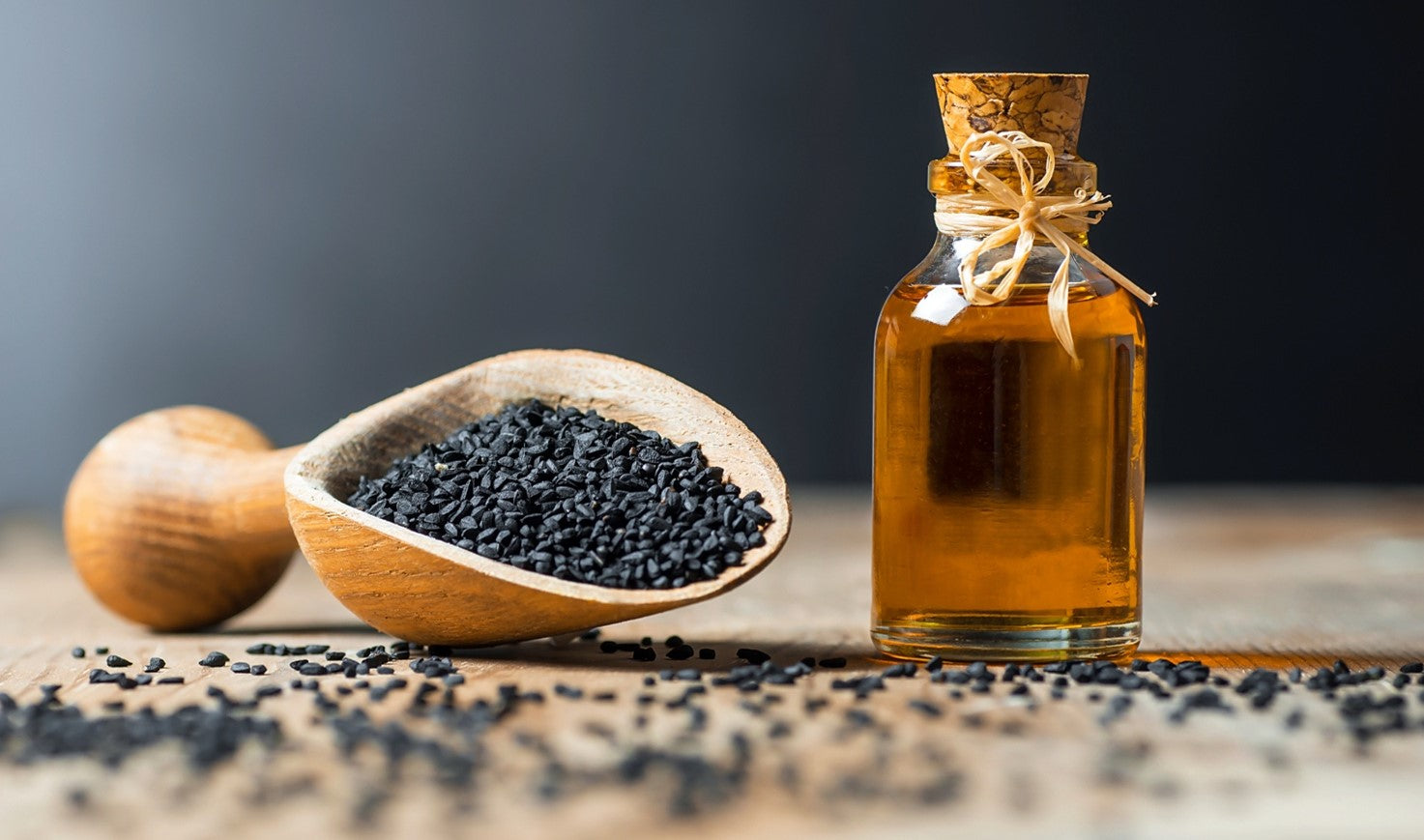
Black Seed Oil: The Allergy Hack You’ve Never Heard About
We’re also dedicated to uncovering the scientific evidence around the benefits of black seed oil and presenting it to you, informed readers who want to extract more health from life.
One of our favourite research tools is Examine.com, a platform that distils the results of multiple, peer-reviewed scientific studies into meaningful metrics that anyone can understand. Looking up black seed (Nigella sativa) on Examine.com makes it very obvious that, among the many benefits of this plant, its effect on allergies is one of its most potent benefits. Examine.com describes this effect as “Notable” — and for very good reason, as you will see later on.
But First, What Is Black Seed?
For those of you who haven’t heard of this miraculous plant before, black seed is an annual flowering plant, native to western Asia and eastern Europe, but naturalised on other continents as well.Cultivating it dates back for millennia, as the plant was used in Ancient Egypt, the Middle East and the Old World as traditional medicine and food flavouring, even though one of the most potent black seed formulations is the extracted oil.
Most people have heard of black seed in the context of Weight Loss1, Type 2 Diabetes2, Cognitive Health3, and Asthma4.
But few have heard of its potent anti-allergy effects, which science has repeatedly demonstrated.
Benefits of Black Seed in Treating Allergic Rhinitis (Hay Fever)
An article published in the Phytotherapy Research journal in 2003 carefully examined four studies, of which two were randomized, placebo-controlled, double-blinded trials (the most rigorous trial design). In the studies, a total of 152 subjects were treated with black seed oil at doses of 40-80 mg/kg/day.
The authors of each of the four studies not only scored the subjective severity of the subjects’ allergic rhinitis symptoms, but they also took blood samples and ran tests such as IgE (immunoglobulin E), eosinophil count, TG, total cholesterol, LDL-c, HDL-c, and others.
The results were definitive: all studies showed a decrease in allergy symptoms in the subjects who took black seed oil. Strikingly, in the first two studies, 80% of the subjects had significant improvement of allergic rhinitis symptoms compared to 45% and 22% respectively of the subjects who received the placebo.
What was most interesting was that a slight, statistically insignificant increase in HDL cholesterol was also observed, as well as a statistically significant decrease in triglyceride levels, suggesting the potential value of using black seed in cardiovascular disease5.
These studies are not alone.
A prospective, placebo-controlled, double-blinded trial of 66 participants6 showed that ingesting black seed oil significantly decreased their nasal congestion, runny nose, nasal itching, sneezing attacks, and mucosal pallor within 2 weeks (by day 15).
Ingesting black seed oil decreases nasal congestion, runny nose, nasal itching and sneezing attacks.
How Does Black Seed Oil Work to Combat Allergies?
It is clear that the effects of black seed on allergies are not just clinical observations — the molecular mechanisms have also been extensively explored.For example, a compound in N. sativa called nigellone7 was shown to inhibit the release of histamine, the molecule that triggers the symptoms of hay fever8.
Another compound, called thymoquinone, has been repeatedly shown to lower inflammation and modulate the immune system, both crucial functions in decreasing the symptoms of allergies9.
Benefits of Black Seed in Treating Food Allergies
Food allergy reactions often include GI issues, such as vomiting and diarrhea. These are a nuisance, but can also lead to serious nutritional deficiencies, especially in young children.In a study published in the prestigious journal PLoS One, black seed was shown to improve intestinal symptoms and immune parameters associated with allergies to ovoalbumin found in eggs. More specifically, both a black seed extract and thymoquinone on its own individually improved allergic reactions to eggs, suggesting the mechanisms by which black seed modulates allergies is complex10.
Key Takeaways
Seasonal allergies and food allergies are on the rise, particularly in children. The most common treatments are harsh antihistamine or anti-inflammatory drugs, which, if taken for extended periods of time, can compromise our immune system. In the case of food allergies, treatments usually involve completely avoiding the food that causes a reaction, which can potentially lead to nutritional deficiencies down the line.All of this highlights the importance of finding natural alternatives that can decrease the symptoms and balance the immune system’s response to the environment. One of these natural alternatives is black seed oil: the allergy hack you’ve never heard about.
As black seed is gaining increasing popularity, more and more studies are surfacing to show its remarkable health properties. We’ll be happy to share them with you as they emerge, just stay tuned.
References
- Qidwai, W., Bin Hamza, H., Qureshi, R., Gilani, A. (2008). Effectiveness, safety, and tolerability of powdered Nigella sativa (kalonji) seed in capsules on serum lipid levels, blood sugar, blood pressure, and body weight in adults: results of a randomized, double-blind controlled trial. J Altern Complement Med. 2009 Jun;15(6):639-44.
- Najmi, A., Nasiruddin, M., Khan, R.A., Haque., S.F. (2008). Effect of Nigella sativa oil on various clinical and biochemical parameters of insulin resistance syndrome. Int J Diabetes Dev Ctries. 2008 Jan;28(1):11-4.
- Bin Sayeed, M.S., Asaduzzaman, M., Morshed, H., Hossain, M.M., Kadir, M.F., Rahman, M.R. (2013). The effect of Nigella sativa Linn. seed on memory, attention and cognition in healthy human volunteers. J Ethnopharmacol. 2013 Jul 30;148(3):780-6.
- Boskabady, M.H., Javan, H., Sajady, M., Rakhshandeh, H. (2007). The possible prophylactic effect of Nigella sativa seed extract in asthmatic patients. Fundam Clin Pharmacol. 2007 Oct;21(5):559-66.
- Najmi, A., Nasiruddin, M., Khan, R.A., Haque, S.F. (2008). Effect of Nigella sativa oil on various clinical and biochemical parameters of insulin resistance syndrome. Int J Diabetes Dev Ctries. 2008 Jan;28(1):11-4.
- Nikakhlagh, S., Rahim, F., Hossein Nejad Aryani, F., Syahpoush, A., Ghafouryan Brougerdnya, M., Saki, N. (2011). Herbal treatment of allergic rhinitis: the use of Nigella sativa. Am J Otolaryngol. Sep-Oct 2011;32(5):402-7.
- El-Dakhakhny, M., Madi, N.J., Lembert, N., Ammon, H.P.T. (2002). Nigella sativa oil, nigellone and derived thymoquinone inhibit synthesis of 5-lipoxygenase products in polymorphonuclear leukocytes from rats. Journal of Ethnopharmacology, Volume 81, Issue 2, July 2002, Pages 161-164.
- Charakravary, N. (1993). Inhibition of histamine release from mast cells by nigellone. Ann Allergy. 70: 237–242.
- Majdalawieh, A.F., Fayyad, M.F. (2015). Immunomodulatory and anti-inflammatory action of Nigella sativa and thymoquinone: A comprehensive review. Int Immunopharmacol. 2015 Sep;28(1):295-304.
- Duncker, S.C., Philippe, D., Martin-Paschoud, C., Moser, M., Mercenier, A., Nutten, S. (2012). Nigella sativa (black cumin) seed extract alleviates symptoms of allergic diarrhea in mice, involving opioid receptors. PLoS One. 2012;7(6):e39841.

